L.A. Kelley's Blog, page 18
April 27, 2016
A Podcast on the Problems and Pleasure of Writing Fantasy
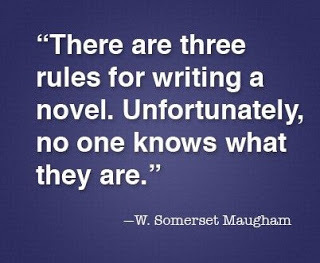 Click on the link below to hear my interview on J. B. Garner's podcast where we discuss the problems and pleasures in writing fantasy.
Click on the link below to hear my interview on J. B. Garner's podcast where we discuss the problems and pleasures in writing fantasy.
https://jbgarner58.wordpress.com/2016/04/26/starving-interview-l-a-kelley-author-of-one-enchanted-evening/
Published on April 27, 2016 12:48
April 7, 2016
Book Review: The Illustrated Compendium of Amazing Animal Facts by Maja Sӓfstrӧm
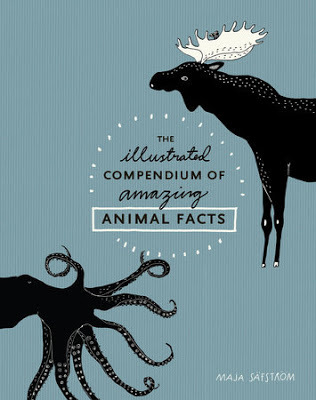 While I don’t regularly read children’s books, every now and then I have to let out the inner child.
While I don’t regularly read children’s books, every now and then I have to let out the inner child.The Illustrated Compendium of Amazing Animal Factsincludes a splendid array of animals from barnyard to ocean to the wild. Sӓfstrӧm chose her subjects simply because they happen to be personal favorites, so the collection has no particular order. It lends the book a quirky charm when you find sea horses next to pandas. Sӓfstrӧm is also the illustrator. The print is handwritten and not typed, but easy to read. The minimalist black and white drawings are both whimsical and sweet. The simple lines are clean and fresh and clearly display a Scandinavian minimalist approach (The author is from Stockholm.)
Each illustration accompanies several fun facts. For instance, if a snail doesn’t like the weather it can go into its shell and hibernate for up to three years. (Big deal. So can I) Many of her animal choices are obvious favorites for other people as well. Who doesn’t love a cute, cuddly koala or a regal tiger? I do take issue with the cockroaches though. In my mind the only good one is a dead one. I didn’t need to know that they can live for days with their heads cut off, but kids generally appreciate an icky yuck factor.
I suggest the book for an approximate age range of 4-8 years. The younger ones will enjoy having it read to them, while older ones will manage nicely on their own. I was also pleased with the construction. The book is a sturdy hardcover . The pages have a good weight and a nice feel to the paper. They’re sure to withstand repetitive use by many little hands. The Illustrated Compendium will be a practical addition to any child’s library and can easily be being passed from older siblings to younger and still maintain its shape. This makes it suitable for a public or school library, as well. A warning to parents: if you want the book kept close to its original condition, hide the crayons. Certain children will find the line drawings irresistible and be tempted to add a dash of color to the black and white. Not that I’ve ever done something like that in my misspent youth.
I received this book from Blogging for Books in exchange for a review.
Published on April 07, 2016 12:09
March 10, 2016
Book Review: This is Your Brain on Sports by Wertheim and Sommers
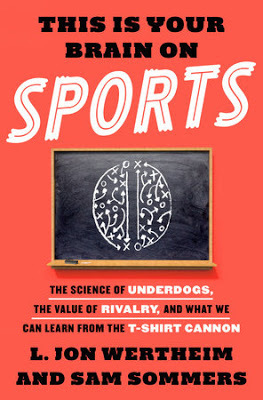 I’m not into sports. I don’t root for any teams and have no interest in the Olympics, World Cup, Superbowl, or anything that requires sweaty people to vie for a trophy. The quirky aspects of both fans and athletes has always been a mystery to me, but thanks to Wertheim and Sommers I have a better understanding of people who sit in a stadium with giant cheese wedge hats on their heads. The nature of sports turns out to be not much different from other forces that shape human behavior. Athletes and fans aren’t so crazy after all, and after reading this engaging book I realize I’m actually more like them then I care to admit.
I’m not into sports. I don’t root for any teams and have no interest in the Olympics, World Cup, Superbowl, or anything that requires sweaty people to vie for a trophy. The quirky aspects of both fans and athletes has always been a mystery to me, but thanks to Wertheim and Sommers I have a better understanding of people who sit in a stadium with giant cheese wedge hats on their heads. The nature of sports turns out to be not much different from other forces that shape human behavior. Athletes and fans aren’t so crazy after all, and after reading this engaging book I realize I’m actually more like them then I care to admit.The book examines sports from many aspects; behavioral psychology, marketing, economics, with a dash of evolutionary biology thrown in. Part of the fun is the often lighthearted approach seasoning the science. Why are quarterbacks always so darn good looking? Blame part of the reason on the halo effect which endows qualities of attractiveness to those in positions of authority or command.
A fascinating section on underdogs explains fan loyalty with teams in the bottom of the rankings. According to studies, the struggle to rise to the top is enough to engage support. As Wertheim and Sommers note, the role of the underdog seems natural. Losers are more human, poor schlubs striving to overcome obstacles like the rest of us. We relate better to them than those with godlike physical talents and attributes. People also frame the performance of a longshot more favorably; the humble, scrappy losers are endowed with more character than those prideful adversaries who stomped all over them. You don’t have to be a sports fan to understand.
This book isn’t a sugarcoated treatise on the benefits of sports. Negative aspects of competition are given an evenhanded investigation. A section on violence explains the link to arousal, and the authors draw interesting parallels between sport's violence, the ability to negotiate a business deal, and ad agencies using arousal to cajole consumers to buy. Apparently sex not only sells, but also, according to research, doesn't detract from an athlete's abilities. Remaining celibate before the big game to improve performance is a myth.
What I particularly enjoyed about This is your Brain on Sports is that it’s written for the fan and nonfan alike. The book is both entertaining and thoughtful. Even when the authors go deep into the science, explanations are easy for the layman to follow. Everyone will come away with a little better understanding of not just sports, but human behavior as well. Sure, sports fans are a little crazy, but apparently so are the rest of us. Now, hand me my giant cheese wedge hat.
I received this book from Blogging for Books in exchange for a review.
Published on March 10, 2016 12:03
February 12, 2016
Book Review - Cure: A Journey into the Science of Mind over Body by Jo Marchant
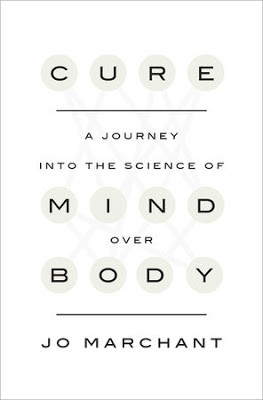 Cure: A Journey into the Science of Mind over Body by Jo Marchant
Cure: A Journey into the Science of Mind over Body by Jo MarchantThe connection between mind and body during illness has long been at the center of a hot debate between the scientific and lay community, especially in Western medicine. Opinions tend to the extremes. Medical convention usually downplays the effect of the mind on healing. On the other end, New-Age nature babies babble about auras and essences. (Commune with the Earth Mother, and while you’re at it gambol through the woods and hug a squirrel.) In a balanced scientific approach, Marchant, a geneticist and medical writer, offers a thoughtful examination of the evidence in an attempt to answer the question: can aspects of the mind be harnessed to cure the body?
Placebos and Stress Marchant investigates medical conditions with mental components. Placebos, for example, are a staple of medical testing, purposely concocted to have no effect on patients, yet they can. Placebos don’t change anything a person is not consciously aware of, such as cholesterol levels. However, Marchant notes in certain instances they are able to significantly alter pain, and can work better than, or as well as, prescription medications. So much so, that even when people know they’re given a placebo, they still receive a beneficial effect. Still, they’re rarely studied. One reason is that placebos effects are often elusive and change depending on the type of placebo, shape, size or color, even the gender and culture of the patient. Marchant notes, “just because the benefits mediated by placebos are mostly subjective, that doesn’t mean they have no potential value for medicine.”
Another area Marchant examines in detail is stress. Over time, stress can have devastating physical consequences, since it actually has the ability to rewire the brain. She delves into case studies involving the benefits of continuous care and supportive interaction. One program called Comfort Talk, reduced the need to sedate children needing MRIs—lessening the need for more medication. What struck me most in much of the reporting in this book was how it often takes only a very small change in treatment, requiring little money or effort, to greatly improve the benefit for the patient. A large part of Comfort Talk, for instance, is simply eliminating scary language.
Brains are weird. Yes, they are. Marchant has written a fascinating book. Cure is neither dry nor dull, and filled with personal stories of patients and researchers, some amusing, some rather heartbreaking. Marchant ends with a strong plea for more scientific research to fully understand the role of the mind in health, but funding sources remain elusive. More than three quarters of clinical trials are paid for by pharmaceutical companies who have no interest in findings that won’t lead to the development of new drug treatments. Here’s hoping at least a few CEOs will read this book and put profit aside for the betterment of all. I received this book from Blogging for Books in exchange for a review.
Published on February 12, 2016 07:32
January 21, 2016
Book Review: Brooklyn on Fire by Lawrence H. Levy
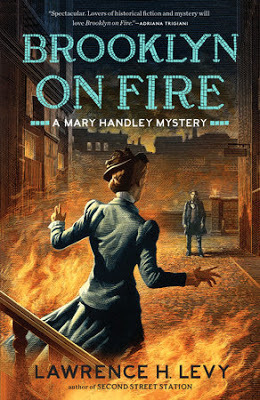 Brooklyn on Fire
I enjoy a book with a plucky heroine, even more so in historical novels than contemporary ones. Spunk is easy to come by in the modern world where nobody blinks at a woman with a nontraditional career. Not so much in 1890 when society relegated all females to second-class status with only a minuscule chance of escaping the dictates of rigid class structure. The heroine, Mary Handley, is a nice fictional addition. Sacked from the police force for her less than condescending attitude, Mary works in a bookstore and sets up a consulting private detective business on the side. Readers should note Brooklyn on Fire is the second book in the Mary Handley series, but works as a stand-alone story. I didn’t read book one and had no trouble following the plot. Levy makes enough references to Mary’s earlier exploits so that her family and relationship with the Brooklyn Police Department are easily understood in context.
Brooklyn on Fire
I enjoy a book with a plucky heroine, even more so in historical novels than contemporary ones. Spunk is easy to come by in the modern world where nobody blinks at a woman with a nontraditional career. Not so much in 1890 when society relegated all females to second-class status with only a minuscule chance of escaping the dictates of rigid class structure. The heroine, Mary Handley, is a nice fictional addition. Sacked from the police force for her less than condescending attitude, Mary works in a bookstore and sets up a consulting private detective business on the side. Readers should note Brooklyn on Fire is the second book in the Mary Handley series, but works as a stand-alone story. I didn’t read book one and had no trouble following the plot. Levy makes enough references to Mary’s earlier exploits so that her family and relationship with the Brooklyn Police Department are easily understood in context.In Brooklyn on Fire, a woman hires Mary to look into the possible murder of her uncle that happened years ago. When her client is later found dead, Mary follows a twisted trail of clues in the search for justice. She tangles with the Brooklyn political machine, upper class New York society, the local police, and her own family. Mary’s investigations eventually lead down the murky path of government corruption and into an interesting subplot that involves securing a water supply for Brooklyn.
The pages of Brooklyn on Fire are strewn with details of historical events and real people from the 1890s. Levy has a flair for describing rough-and-tumble life at the end of the nineteenth century. He mixes fiction and history in an entertaining way in order to depict the power struggles between the men who ran Brooklyn before it became part of New York City. The metropolitan area was a dangerous place, especially for a woman who pokes her nose into criminal activities. Luckily, our determined heroine also knows ju-jitsu.
Quibbles and Bits Let’s face it, Mary’s romance with a Vanderbilt is a stretch. No matter how plucky the heroine, it’s not likely the two could ever have had even a short-lived relationship, let alone travel together in the Victorian Era as they do in the book. Also, in a novel with a large cast of characters, both Mary’s brother and another man are named Sean. Two people with the same name in a book always bugs me. These criticisms are minor, and any reader with an interest in historical fiction should check out Mary Handley’s adventures.
I received this book from Blogging for Books in exchange for a review.
Published on January 21, 2016 10:25
January 3, 2016
Book Review of Nonsense: The Power of Not Knowing by Jamie Holmes
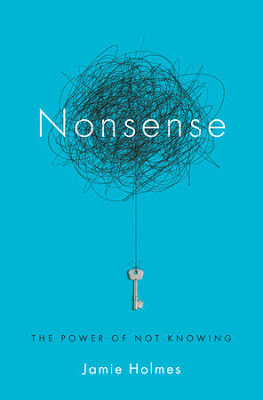 Let’s ring in the New Year with a little nonsense, more precisely confusion and ambiguity. Modern life is full of conflicting advice and unanswered questions which leave people with vaguely unsettled feelings. What happens when we’re uncertain? How do we make the best decision when faced with a problem with multiple solutions? Jamie Holmes has written an insightful book that tries to answer the question do you embrace ambiguity or be like me—hunch in a corner and sob quietly?
Let’s ring in the New Year with a little nonsense, more precisely confusion and ambiguity. Modern life is full of conflicting advice and unanswered questions which leave people with vaguely unsettled feelings. What happens when we’re uncertain? How do we make the best decision when faced with a problem with multiple solutions? Jamie Holmes has written an insightful book that tries to answer the question do you embrace ambiguity or be like me—hunch in a corner and sob quietly?People fear uncertainty. The need to resolve anxious feelings is deeply rooted and multifaceted. It can also be dangerous, especially during periods of social, political or economic confusion. The desire for fixed solutions is so great voices in the margins are shunted aside. “Fear and uncertainty...intensify people’s appetites for absolutes.” Donald Trump gleefully mouthing a platform of wide-eyed hysteria that all Muslims are bad gels nicely with a study Holmes cites on prejudice. Prejudiced people cling to the past with rigid thinking, refuse to consider all sides, and “latch on to what is familiar, safe, simple, definite.”
Embrace failure Uncertainty is unpleasant, but in the classroom under the right conditions, uncertainty is a very good thing. People who are sure of themselves, rigid, and uncompromising, are neither innovative nor creative. Those qualities come from not knowing an outcome and trying alternatives. Having your child fail and not immediately jumping to the rescue is difficult for a parent, but “the best way to help students innovate is ”to move beyond standard grading measures and reward students for their willingness to experiment, tolerate failure, and take calculated risks.” Feelings of certainty should not be thought of as failure, but rather desirable and the key to innovative thinking.
According to Holmes, the positive aspects can also be applied to the business word. Successful innovation often comes after a string of failures. A satisfied person doesn’t look to the future and wonder what if? That edgy feeling keeps you on your toes. While businesses routinely examine failures, Holmes produces examples from companies such as Ducati, Zara, and Piggly Wiggly that successes should be put under the same scrutiny. “Embracing uncertainty after success means…always question the roles played by unforeseen factors.” Knowing your success is more than luck is as important as having the reasons for failure.
Heavy on the social sciences, easy on the noggin Although heavy on the social sciences, this is a very readable book. Holmes breaks down complex issues into easily digestible pieces and offers several entertaining thought experiments to determine your level of rigid thinking. I scored in the mid-range so for my New Year’s resolution, I’ll stop sobbing, get out of that corner, and embrace a little more nonsense. On that point, I’m not ambiguous, but certain.
Published on January 03, 2016 12:14
December 18, 2015
Call me when the force really awakens. Review of Star Wars: The Force Awakens
Meh.
Sorry, that’s the best I can muster. Star Wars: The Force Awakens isn’t an awful movie, but it’s not a great one either. Read on, and I promise no spoilers.
Haven’t I seen this somewhere before? A teenager on a desert world with a hard life who doesn’t fit in. An robot with a secret agenda. A reluctant hero. A masked villain with a mysterious past. A super weapon. No I’m not describing the original Star Wars. All those same elements are in this movie along with many other similarities. Star Wars was an iconic moment in cinematic history. Any new movie in the genre should be a homage to the original, not slavishly derivative.
The surprises are disappointments. Kylo Ren’s real identity is revealed halfway through the movie. Enough hints were dropped so that if you had been paying attention, his relationship to other characters was obvious. The news arrives not with a gasp, but with a yawn. While we’re on the subject of Kylo Ren, there hasn’t been a more irritating villain since Hayden Christensen’s Anakin Skywalker. Whiny and grating, there is nothing scary about him. Darth Vader was chilling from the first moment he appeared on screen. He never told you what he was going to do to you. He simply snapped your neck like a dry twig when you didn’t answer his questions. The worst thing he said? “I find your lack of faith disturbing.” It’s still creepy.
Kylo Ren stomps around the movie like a petulant schoolchild. Why aren’t I popular? Why don’t the cool kids like me? The rebellion has nothing to fear from him. Every time he throws another hissy fit (and he throws several) I imagine the storm troopers rolling their eyes beneath the masks and thinking, Oh crap, not again. Doesn’t he ever zip it? Eventually, they’ll rise up and kill him. Not because they fear for their lives, but simply because they’ve grown tired of his whimpering petulance. Ah well, what can one expect when Kylo Ren’s master, Supreme Leader Snoke, isn’t any more threatening? He comes across as a cranky CEO rather than an archetype of evil.
BB-8 was supposed to be the new R2-D2. Not even close. A good part of R2-D2’s charm was his relationship with C3PO. He nagged, C3PO protested. They argued, they made up. They were a metallic odd couple. The range of whistles and clicks had a funny, weird friendship dynamic missing from the movie. BB-8 is a cute little robot, but has no one to talk to except the occasional human. There’s nothing memorable about him.
Apparently, love doesn’t conquer all The end of the first trilogy left you with warm feelings about Han and Leia. Two people who needed each other found each other. Sure, the road ahead wasn’t easy. There were still dangers lurking, remnants of the Empire who wouldn’t play nice, but they had each other. They would face the trials together and triumph.
Nice to know we were all wrong. Han and Leia are now grumpy Grammy and Gramps. There is no passion. This is no romance. They seem more like brother and sister. Kirk and Spock had more sexual chemistry in Abrams’ Star Trek movies than these two. Ford and Fisher are actors. Couldn’t they at least have acted as if they once had a spark?
How to improve the series I’m so tired of all the heroes with daddy issues. This film, like so many other blockbusters, embraces father/son conflict, hoping to pull on the heartstrings. It doesn’t. All it gets from me is a Not again. Don’t they have any new ideas? The mantra in bloated budget movies seems to be if it worked the first five hundred times, it’s good enough. The big boys in Hollywood need to cut back on their cappuccino budget and find money to add a few female screenwriters. Women would nip that daddy issue nonsense in the bud and come up with something more creative to add drama and engage an audience. Better yet, use women writers who have children. They know a thing or two about dealing with whiny toddlers and they most certainly would never write one as a villain.
Why are the powers-that-be in Hollywood so afraid of a little warmth and romance? It won’t turn an action film into a bodice-ripping chick flick, but rather humanizes the characters. There can and should be a happily ever after for well-loved heroes and heroines in movies that are meant to be fun. It makes us all feel a little better knowing that love can conquer all—even if it’s only on the movie screen. Don’t take that away from us.
Pluses. Really? Yes there were a few. In particular, the new cast additions were excellent. Rey made a plucky heroine. Finn’s transition from storm trooper to reluctant hero added a nicely done twist. Poe Dameron’s pilot had a gritty appeal as a seasoned warrior. The story should have focused completely on them and their fight against the First Order. Dump Kylo Ren and Snoke. Add a new villain, and the movie would have been ten times better.
More to come. Maybe the second movie will improve. With a young cast this good there’s hope, but I won’t hold my breath. The first time I saw Star Wars, I was left with a triumphant feeling, and a desire to immediately watch the movie again. Not this time, I’m afraid. It was an okay movie with an okay plot that generated nothing more than a vaguely dissatisfied feeling. With all the money thrown into this project, the end result really should have been memorable. It's not.
Sorry, that’s the best I can muster. Star Wars: The Force Awakens isn’t an awful movie, but it’s not a great one either. Read on, and I promise no spoilers.
Haven’t I seen this somewhere before? A teenager on a desert world with a hard life who doesn’t fit in. An robot with a secret agenda. A reluctant hero. A masked villain with a mysterious past. A super weapon. No I’m not describing the original Star Wars. All those same elements are in this movie along with many other similarities. Star Wars was an iconic moment in cinematic history. Any new movie in the genre should be a homage to the original, not slavishly derivative.
The surprises are disappointments. Kylo Ren’s real identity is revealed halfway through the movie. Enough hints were dropped so that if you had been paying attention, his relationship to other characters was obvious. The news arrives not with a gasp, but with a yawn. While we’re on the subject of Kylo Ren, there hasn’t been a more irritating villain since Hayden Christensen’s Anakin Skywalker. Whiny and grating, there is nothing scary about him. Darth Vader was chilling from the first moment he appeared on screen. He never told you what he was going to do to you. He simply snapped your neck like a dry twig when you didn’t answer his questions. The worst thing he said? “I find your lack of faith disturbing.” It’s still creepy.
Kylo Ren stomps around the movie like a petulant schoolchild. Why aren’t I popular? Why don’t the cool kids like me? The rebellion has nothing to fear from him. Every time he throws another hissy fit (and he throws several) I imagine the storm troopers rolling their eyes beneath the masks and thinking, Oh crap, not again. Doesn’t he ever zip it? Eventually, they’ll rise up and kill him. Not because they fear for their lives, but simply because they’ve grown tired of his whimpering petulance. Ah well, what can one expect when Kylo Ren’s master, Supreme Leader Snoke, isn’t any more threatening? He comes across as a cranky CEO rather than an archetype of evil.
BB-8 was supposed to be the new R2-D2. Not even close. A good part of R2-D2’s charm was his relationship with C3PO. He nagged, C3PO protested. They argued, they made up. They were a metallic odd couple. The range of whistles and clicks had a funny, weird friendship dynamic missing from the movie. BB-8 is a cute little robot, but has no one to talk to except the occasional human. There’s nothing memorable about him.
Apparently, love doesn’t conquer all The end of the first trilogy left you with warm feelings about Han and Leia. Two people who needed each other found each other. Sure, the road ahead wasn’t easy. There were still dangers lurking, remnants of the Empire who wouldn’t play nice, but they had each other. They would face the trials together and triumph.
Nice to know we were all wrong. Han and Leia are now grumpy Grammy and Gramps. There is no passion. This is no romance. They seem more like brother and sister. Kirk and Spock had more sexual chemistry in Abrams’ Star Trek movies than these two. Ford and Fisher are actors. Couldn’t they at least have acted as if they once had a spark?
How to improve the series I’m so tired of all the heroes with daddy issues. This film, like so many other blockbusters, embraces father/son conflict, hoping to pull on the heartstrings. It doesn’t. All it gets from me is a Not again. Don’t they have any new ideas? The mantra in bloated budget movies seems to be if it worked the first five hundred times, it’s good enough. The big boys in Hollywood need to cut back on their cappuccino budget and find money to add a few female screenwriters. Women would nip that daddy issue nonsense in the bud and come up with something more creative to add drama and engage an audience. Better yet, use women writers who have children. They know a thing or two about dealing with whiny toddlers and they most certainly would never write one as a villain.
Why are the powers-that-be in Hollywood so afraid of a little warmth and romance? It won’t turn an action film into a bodice-ripping chick flick, but rather humanizes the characters. There can and should be a happily ever after for well-loved heroes and heroines in movies that are meant to be fun. It makes us all feel a little better knowing that love can conquer all—even if it’s only on the movie screen. Don’t take that away from us.
Pluses. Really? Yes there were a few. In particular, the new cast additions were excellent. Rey made a plucky heroine. Finn’s transition from storm trooper to reluctant hero added a nicely done twist. Poe Dameron’s pilot had a gritty appeal as a seasoned warrior. The story should have focused completely on them and their fight against the First Order. Dump Kylo Ren and Snoke. Add a new villain, and the movie would have been ten times better.
More to come. Maybe the second movie will improve. With a young cast this good there’s hope, but I won’t hold my breath. The first time I saw Star Wars, I was left with a triumphant feeling, and a desire to immediately watch the movie again. Not this time, I’m afraid. It was an okay movie with an okay plot that generated nothing more than a vaguely dissatisfied feeling. With all the money thrown into this project, the end result really should have been memorable. It's not.
Published on December 18, 2015 15:55
December 5, 2015
Book Review: The Woman Who Would Be King by Kara Cooney
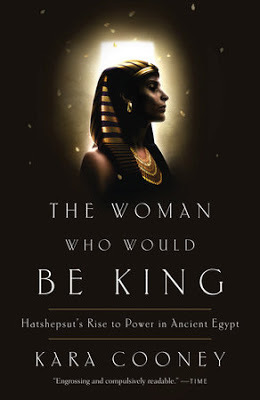 In the long twisted course of human history it’s rare to come across a woman yielding true power. Even highborn females were generally under the thumb of male relatives and relegated to serve as either prizes of war or political pawns. Cooney has written a fascinating history of the only known female pharaoh, Hatshepset.
In the long twisted course of human history it’s rare to come across a woman yielding true power. Even highborn females were generally under the thumb of male relatives and relegated to serve as either prizes of war or political pawns. Cooney has written a fascinating history of the only known female pharaoh, Hatshepset. Little is known about Hatshepset’s life. Egyptians didn’t record individual thoughts and motives, to them they didn’t matter. Because they “enacted their politics through the rituals of religion, we cannot know exactly where the affairs of government ended and the ideology started.” Cooney circumvented the lack of information by imbuing the book with a quasi-biographic tone. Historical purists may turn up their noses since the author had no firsthand knowledge of Hatshepset’s beliefs and feelings, but the book doesn’t suffer from the speculation. This is less history than story. Attempting to explain Hatshepset’s motivation and sentiments gives a voice to a fascinating woman long dead who succeeded in a culture and time far different from our own and climbed to a position of power few ever achieved.
As a teenager Hatshepset’s husband/brother died. With no son to succeed to the throne, she became the regent to the new pharaoh, Thutmose III, infant son of a lesser wife. She was both his stepmother and his aunt. Retaining her role as Egypt’s High Priestess, God’s Wife of Amen, Hatshepset built her political career supported by the Amen priesthood. By the age of twenty she claimed her divine right and formed a co-regency with Thutmose III. A shrewd politician, she eventually used her insights into the political and spiritual life of Egypt to redefine the nature of kingship.
After Hatshepset’s death, Thutmose III began the long process of asserting his own power and erasing her contributions and even her name from the historical record. Poor Hatshepset. Early Egyptologists took the misogynistic stance that she was “a woman who took what was not hers and got what was coming to her.” In the end, Cooney writes “Hatshepset’s greatest contribution and most daring innovation was her methodical and calculated creation of the only truly successful female kingship in the ancient world.” She managed her rise to power without assassination or a bloody coup and ruled peacefully for many years. That there is so little known of her is more the shame, but in The Woman Who Would Be King, Cooney manages to imbue her story with the dignity it deserves.
I received this book from Blogging for Books in exchange for a review.
Published on December 05, 2015 15:17
November 16, 2015
99 Cent Sale for The Naughty List
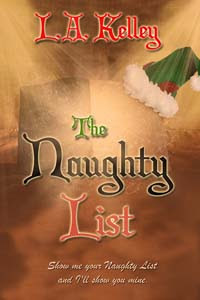 The Naughty List
L. A. Kelley
The Naughty List
L. A. Kelley
99 Cents November 13-27
This is not your typical yuletide tale.
Murder, mystical artifacts, an invisible demon with anger management issues, and an overbearing cupid—not what Rosalie Thatcher wished for on her Christmas list.
The holidays had always been a magical time for Rosalie, but not this year. Stephanie, her new manager at Penrose’s Department Store, is determined to make this season the most profitable in the store’s history, even if it sucks the life out of every employee. Introducing arbitrary rules and stealing the affections of the cute temp Santa were bad enough, but forcing Rosalie into the stupid elf hat was the worst. The worst, that is, until she meets a real E.L.F. (Elemental Life Form) named David and gets lassoed into a desperate hunt for the stolen Naughty and Nice List. Now all Rosalie and David must do is dodge a murderous invisible demon and recover the missing artifact before hellhounds track them down. The couple race against time for without the magical guidance of the Naughty and Nice List, the world will tumble toward eternal chaos.
Excerpt:Stephanie rounded the corner. She plopped a large cardboard box down on the counter. “I’ve decided on more festive attire for the staff to increase holiday spirit and, thereby, increase customer spending.” She pulled off the cover. Rosalie’s mouth dropped open. “What the hell is that?”“An elf hat, of course. It’s festive.”“It’s butt ugly.”Stephanie glowered. “No one asked your opinion, Rosalie. No one cares about your opinion. Attitudes such as yours prove me right. You need more holiday spirit.” She shoved the hat in her face. “Everyone wears one. Put it on.”Fashioned out of bright green felt, the cone-shaped hat had Penrose’s written in glittery gold paint smack dab in the middle. On the pointy top dangled a pompom the size of her fist that jingled annoyingly with the slightest movement. The rim, trimmed with bushy fake white fur, did nothing to offset the huge elf ears stitched in as giant flaps on either side. Rosalie begrudgingly slipped on the hat. Immediately, her head began to sweat. The ears itched like crazy.Stephanie beamed. “Perfect. I told all the assistant managers to stop by Customer Service and pick up hats for their departments.” She turned on her heel.“You forgot yours,” Rosalie snidely called out. Of course, Stephanie ignored her.****David sunk wearily into a chair in the break room, cradling a disposable cup in his hands. He appropriated the stale coffee from the pot someone forgot to empty out and clean. He barely noticed the bitter taste. Ten minute break…ten minutes was all he needed. The caffeine would keep him on his feet another couple of hours. He rubbed his eyes, willing away the crushing fatigue. Night after night David wandered Penrose’s four floors in a fruitless search, pulling open boxes, checking under counters. Although the nagging pull continued to graze his senses, The Book was nowhere to be found. He’d come no closer to pinning down the location than when he arrived. The mystical connection now appreciably slackened under his mental touch. David’s stomach knotted up in fear. Soon the link would disappear forever. Something alluded him—some special storage area, some door he hadn’t opened. Why couldn’t he find The Book?In frustration, David drained the last of the coffee. He flung the cup to the wastebasket, overshot, and hit the corkboard on the wall. A clipboard crashed to the floor. He stifled a curse. Bending down to pick it up, his eyes strayed over the top sheet. “Motivation Memo from Stephanie Crowder to all Employees,” he read. “Below are daily reports from Sneaky Shoppers.” Oh brother, Stephanie is a real piece of work. She has her own secret police. He snorted in amusement scanning the list of ridiculous infractions.“Now, now, Rosalie Thatcher of Customer Service,” he muttered. “Two transgressions—you’ll never get off the Naughty List with that attitude. Imagine, not remembering to say have a special holly jolly holly-day at Penrose’s. I see you were also caught without an elf hat.” Elf hat? His lips twitched in an involuntary grin. His dad would appreciate the joke. As David replaced the clipboard, he suddenly remembered Rosalie. She was the girl he followed to the security office. The picture of the young brunette with a friendly natural smile popped into his mind. A smile like that couldn’t be faked. She liked people. She liked her job. He wondered how she felt about Penrose’s now.David experienced a rush of guilt. All around the atmosphere had changed. He was super-sensitive to the yuletide. Magic in the air, holiday spirit, whatever—there was always something indefinably optimistic about this time of year. Even as a kid, before he understood family responsibilities, he sensed the truth. As easily as he now sensed the diminished effect of The Book. Whatever goodwill the season stirred up rapidly faded. Hard-working people like Rosalie paid the price of his stupid mistake.The young man slipped out of the break room. He had enough time left to make one quick circuit of the first floor before staff trickled in. He worked from the front of Penrose’s to the back corner, ending up at Customer Service. For an instant, his spirits rose. A large box stashed underneath the counter wasn’t there the last time he checked. He ripped off the top, pawing through the contents. Fingering the garish green material, David didn’t know whether to laugh or cry. The oversize ears stuck out like a genetic experiment gone horribly wrong. The lining felt like steel wool. Had the holiday spirit been reduced to this?A wave of despair enveloped him. “I’m so sorry, Rosalie.”On impulse, David reached into his pocket. He pulled out a gold-wrapped chocolate bar saved for later, swiped from a stash hidden in the store manager’s office. David scribbled on a sticky pad and pressed the note to the wrapper. He slipped the candy under the counter just before a sudden murmur of voices broke the silence. The staff had arrived. He ducked behind a rack of clothing in the back as a girl walked up to the counter, an elf hat tucked under her arm.“Ears, Rosalie.”She halted in mid-stride. A sharply dressed twentysomething in a skin tight pencil skirt swooped down on her. To get a better view, David carefully eased back the clothes hanging in front of his face. He saw Rosalie’s fingers clenched around the hat. He chuckled to himself. She’s pissed, but hides her aggravation well. Sadhri would definitely approve of her self-control.“Stephanie,” Rosalie stated calmly, “the hats are extremely uncomfortable. Everyone hates them.”“Nonsense, they’re fine.”“If you simply try one on you’ll see—”“I don’t have to. I know they’re fine. The hats put people in the holiday spirit and cheerful people spend more money.” Stephanie examined her perfect French manicure. “So close to Christmas is an awful time to be out of work.” Rosalie jammed the hat on her head without another word. “Excellent,” cooed Stephanie. “Keep that attitude up and your name will stop appearing on the Motivation Memo.” Without another word, she flounced off.David knew he should dash-away. Every moment in the open was risky, but he couldn’t take his eyes off Rosalie in the idiotic hat. What would she do?The young woman leaned against the counter glaring after Stephanie. She bobbled her head back and forth and spouted in a falsetto sing-song:“I’m a special elf from Penrose’sI wear the special hatYou are not a special elfYou’re a dirty ratYou don’t belong at Penrose’sYou don’t know how to playWiggle your tight ass out of hereDamn you, go away.”David snorted. Rosalie stiffened and turned around.“Who’s there?” she called
Buy Links:
Amazon
B&N
Apple ibooks
Published on November 16, 2015 05:29
November 3, 2015
Today is Cliché Day. Let's Celebrate!
Today is Cliché Day!
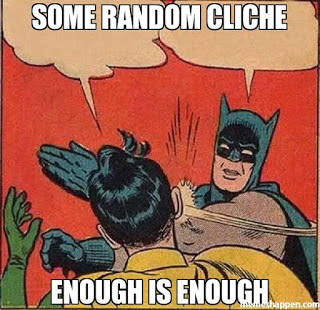 A Haiku for Clichés
A Haiku for Clichés
Now you’ve gone too far
Your clichés will drive me nuts.
Go jump in the lake.
 A Haiku for Clichés
A Haiku for Clichés
Now you’ve gone too far
Your clichés will drive me nuts.
Go jump in the lake.
Published on November 03, 2015 06:37



